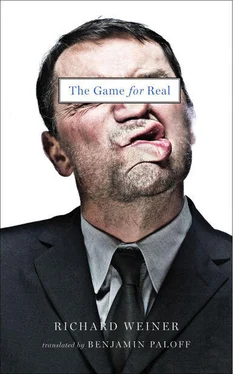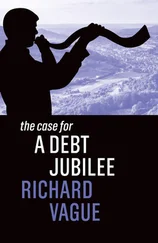The gendarme, not letting him out of his sight, stepped back neutrally.
“And now? What say you now?”
Mr. Steel looked.
“You are obliged to say something.”
Mr. Steel looked.
“You have nothing to say to me?”
“Me? No,” Mr. Steel said.
He extended his arm. He remembers it well: he extended his arm with the intention of striking, but at right that moment he caught sight of himself, and somehow of himself as a person who’s, of course, standing there with his arm extended, but not to strike so much as to gain his balance: under one foot it was as if the ground had suddenly gone slack, literally like a folding table when its latch slips, and it was as though that latch were Mr. Steel’s “Me? No!” — Thus he was flailing for balance, and into this struggle, which had soured into deranged fury, there fell:
“You shitass!” he heard, having also sensed the gendarme’s vulgar assault.
“You shitass!” he heard again, and this time with the tallow-solidified amazement that it was Mr. Steel who’d said “you shitass”; but the eyes that sought Mr. Steel suddenly fell as though through a chute to the gendarme’s eyes, and his face was lashed by a hot and acidic, mercenary “Mum’s the word, is it?”
It was only through the increased distance between himself and Mr. Steel that he comprehend that the gendarme had thrown him to the floor. He saw the gendarme lying with Mr. Steel in a sort of comical, heartfelt embrace, thus a thing so unbelievable that he unwittingly rubbed his eyes, convinced that he was suffering some grotesque day-blindness; but, having rubbed his eyes, he realized that he was seeing right, it was just that his interpretation was faulty; that embrace was nothing other than the friendly tussle of Mr. Steel on the offensive with a compulsorily impartial gendarme, who issued a paternal reproach:
“There, there, no, we can’t give him a thrashing, what are you thinking.”
And Mr. Steel disentangled himself; he did so with a seething glance at his paternalistic antagonist, and you could see how the tamed offense within him was obediently and submissively abating: like a person who, having wrestled in darkness, has realized his error, that he had been wrestling unknowingly with his friend, and he said, “No? But just take a look at him.”
“Right,” said the gendarme, “but when it comes down to it you have no proof.”
The words “but just take a look at him” are seductive, like a precarious path. They lead to the mirror. As he is again gazing into it, he somehow sees himself the way we see ourselves at the end of a road we have chosen for ourselves. He clashed with his own image as with a stranger with whom we have agreed to meet, and whom we recognize at first sight, surprised without the surprise.
“Right. .”
The gendarme’s “right” has the appearance of something full, of something that has gorged itself on revolting food. It has to be overcome to not be thrown up, to not blurt out, as if pulled from a bulging sack of cryptogams, something along the lines of “we all know he’s a shitass, Mr. Steel, of course he’s a shitass, but the law is the law: we’re not allowed to say it.”
“The law protects me,” the image says, concealing it skittishly; in its eyes, however, was lodged a relief so base that he shouted his image down.
“Shitass,” he repeats in his head, having broken into the bulging eyes of a gentleman who has been caught in indiscretions, and having cuffed him so brutally that the eyes didn’t so much as dare to blink. Having broken in and thus hedged his bets, he lowers himself into some unnamable depths. A few things hinder him on his descent; he runs into obstacles, weird obstacles! Obstacles that obstruct out of a Samaritan impulse: “we won’t let you go further; you wouldn’t be able to stand the sight of it; you’re weak; not hardy enough; maybe later. .” — But the iconoclastic hatred through which he has spotted, as though in a sudden luminous rupture, something he takes for his goal, for an attainable goal, relieving and direct, bedazzled him with a suicidal euphoria and endowed him with undreamt-of strength. Some things hindered him, other things compensated with a path to a place — but he knows — he can’t not discover, and he breaks and crushes the obstacles, brilliantly on the verge of something that’s heading for disaster, and more and more dizzyingly so. He breaks, he crushes everything, everything that urges him to believe, with pure intent and after due deliberation (he doesn’t doubt it), “that maybe it’s not so bad for him after all.” A terrible and liberating path, but nevertheless a sort of enviable impact at the bottom when, having denied outright everything he could have taken root in, he saw himself growing out of mold, rot, and muck.
He stood up and approached the mirror; he was growing over with a disheartening happiness — a creeping, atrophied scrub pine. Thus he was face-to-face at last with the villain he’d been pursuing for so long, the villain who coaxed him, beguiled him, deceived him; now he has him, now he’s bewitched him, now he won’t get away; he’ll feast a bit upon his splayed hatred before. .
Before what? Might he secretly long to allow himself to go soft again already? With these tightly, albeit not forcibly, closed lips of the large and, one would say, decent mouth, which keeps quiet so proudly? With these eyes, which it isn’t like they are standing up “for their rights,” on the contrary, they acknowledge that the statute of limitations is up, though not on all hell breaking loose; on human hell? With these hands, which push him away, which are terrified of him, but with a grip that at the same time as though impeded the assault of the stone-throwers and said, “just a little more patience, there might still be something out there to exonerate him”? He won’t be coaxed. All done with his perverse mania for deliberately stacking the deck, so that he would lose. He won’t be coaxed. And then: his one shot is for him to harden himself against himself. He knows it well, this human inclination to deal cleverly in contraband: to condemn himself to the deepest hells, but to reserve a purgatorial corner even there. He’ll cut himself out. He won’t count on his mouth, his eyes, his hands: exculpatory witnesses? (He’d round them up if he wanted: don’t you hear them clambering behind the door?) — Judges are advised to be strict with exculpatory witnesses in their own litigation: you’re getting ahead of yourself, you’re a bit impatient, gentlemen; suspects, suspects! — Let’s discuss instead the witness as is — as is, for example, Zinaida’s view, or the words “why didn’t you smack him one?” — They’re witnesses, after all! Haven’t been bought off! Unbiased! And actually even too forgiving, for is Zinaida then aware that with her “why didn’t you smack him one?” she was actually providing him a back door? Put properly, the question would have to be: “How is it that you were able not to smack him one?” — To a question put that way there’s no stylistic frippery, no equivocation. If we ask someone who was behaving the way he was behaving — if we ask him, “How is it that you were able not to smack him one?”—the answer’s well within reach: concise, firm, unambiguous. For that matter, it’s been given: “You shitass!”
Keep looking, please, keep looking, in case you find a false plaintiff who, having been convicted of perjury, would vomit at the accusatory word “shitass.” — The world isn’t perfect, but the flip side isn’t, either. Irrespective of immanent justice. As he is standing here, he is boasting of his faith in immanent justice. No, he’s not boasting; he believes in immanent justice. It’s a faith-support. A support, I say. Did you suppose perhaps that he would betray it because today it happened to be testifying against him? Because it happens that it’s his own skin at stake? And it would be pure metaphysical politics! How’s that? — That’s really what you were expecting? What an outrage! Who would have said, who, that we would get to the point of being so overly suspicious of ourselves!!! And why, I ask? Because, I’ll answer, some crook tossed “you shitass” in our face. As if we didn’t know that crooks are cowards. What, then, does the crook’s “shitass” amount to? Everyone knows that no one senses a dangerous advantage more keenly than a coward. A coward is insolent only as far as his insolence pays off. Can you imagine a coward who would say “you shitass” to someone who’s at least his equal? Never!
Читать дальше












